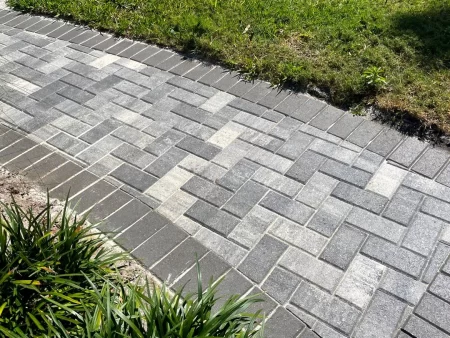
Brick pavers are an elegant and classic look that can withstand quite a bit. They are great for so many landscaping projects.
Many do not realize how many years brick pavers have been utilized. Walk down a London road, and you’ll see them. Many streets in Boston have these pavers as well. These can often be found in various historic districts. These blocks have been through a lot- people and auto traffic for decades, and weather conditions from blistering sunshine to rain to snow.
Brick pavers are manufactured from slate and/or clay. Once they become blazed in a hearth at elevated temps, they are very robust and capable of bearing hefty weights. The heating shifts the paver’s consistency through vitrifying. Thus, they’re impenetrable, so they won’t absorb water. As these pavers are always laid flat when lining sidewalks, front porches, verandas, and terraces, these blocks need to be solid. They do not contain any cavities in their bodies to ease their mass. Therefore, they permit the cement to secure them collectively.
The color of pavers can fluctuate from brown-red to earth-tone beige to dark purple. The coloring will differ dependent on the mineral measurement of the clay or shale applied, along with the extent of exterior treatments that can be used. Paver sealing will allow the blocks to last longer. As opposed to concrete goods, paving bricks’ natural color doesn’t change much with time.
You can expect to pay approximately $2.25 to $6 per square foot prior to installation. However, should they be hand-crafted or possess a specialized finish, the price can go up to $7.50 or more per square foot.
While the brick business provides an estimate that pavers will last about 40 years, brick-paver sidewalks in imperialistic-period municipalities have lasted almost 4 times that. Many of these brick roads have been serving consistent traffic for almost 150 years. Warranties for brick pavers may be anywhere from 20 years to 100 years. Some pavers may not even contain a warranty.
- People choose to have brick pavers installed for many reasons. Some of the advantages of these bricks include the following:
The bulk of paving stones sold in the United States fulfill manufacturing morals for compressed force, immunity to cracks and scratches, and slight water absorption, thus giving them an exceedingly lasting material for terraces, footpaths, and more. In terms of pressure, brick pavers that are graded for ponderous automotive traffic have a minimal pressure of 10,000 psi. - Block pavers are easy to maintain and take care of. They don’t require any special care. To get rid of lichen, algae, and stained areas, simply wash them as needed with mild soap and a stiff brush. Pavers also don’t need to be sealed because they won’t fade. A poor installation is usually to blame for any cracked or broken pavers. However, these are simple to remove and replace.
- Pavers are also great for the environment. Manufacturing brick takes less power and creates fewer emissions in comparison to other supplies, such as synthetic stones. Pavers additionally possess an extended life span. Lasting 100 years plus, it is not uncommon to have these bricks be recovered and recycled.
Just as there are pros to utilizing brick pavers, there are also a few cons:
- Pavers have been known to be costly. One can anticipate spending 15 to 20% extra than the cost of cement ones. That converts to around $320 to $430 more in supplies to construct an ordinary-sized courtyard.
- Brick pavers are only available in a few sizes and even fewer shapes than paving stones, which come in a variety of earthy tones. The majority of these shapes are squares and rectangles. Concrete pavers, on the other hand, come in a wide range of hues, textures, and geometric shapes.
- The grass may be a problem because many brick paver jobs are in the sand. These frequently develop in the joints between the pavers. You are less likely to see the grass if the pavers are set in cement.
You might wonder if your brick paving project should be a do-it-yourself project or if you should hire it out. Little jobs, such as a brick walkway or patio, might be simple enough for homeowners to complete on their own. However, bigger projects, especially those that use mortar brickwork, should be left to a professional. Anticipate paying anywhere from $10 to 30 per square foot, including the supplies. This will obviously be dependent upon where you reside.
If you’re in the Tampa, FL, area and want to learn more about brick paver restoration or paver sealing, call Unreal Paver Seal Tampa Bay. This family-operated business can get the job done right so you can get back to enjoying your outdoor space.

